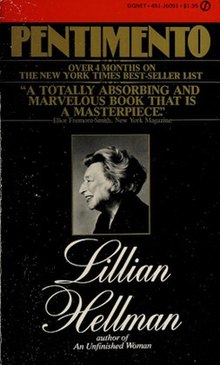 Cover for a 1974 Canadian printing | |
| Author | Lillian Hellman |
|---|---|
| Publisher | Little, Brown and Company [1] |
Pentimento: A Book of Portraits is a 1973 book by American writer Lillian Hellman. [2] It takes the form of an autobiographical work, focusing on "portraits" of various people that had effects on the author throughout her life. [1]
Contents
The book was subject to controversy over the authenticity of a section about an anti-Nazi Resistance member called "Julia", which was later made into Fred Zinneman's film Julia . A psychiatrist named Muriel Gardiner later suggested that her life story was fictionalized as Julia. Gardiner was a wealthy American who went to medical school in the First Austrian Republic following World War I and became involved in the illegal and underground Social Democratic Party of Austria under the rule of Engelbert Dollfuss and the later Austrian Resistance to Nazism there before her return to the US in 1939. [3]